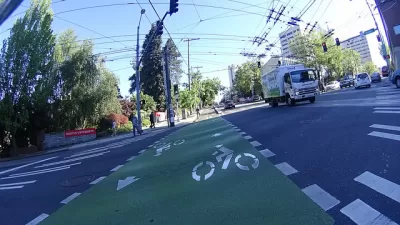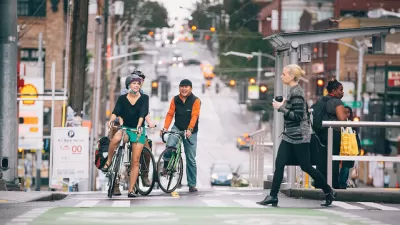Almost half of bike helmet citations in the city are issued to people experiencing homelessness.

Seattle's all-ages bicycle helmet law has long prompted criticism, and new data shows uneven enforcement that disproportionately affects the unhoused. Since 2017, Seattle police have only given out 117 citations for lack of helmet use. Of those, 50 or more were given to homeless people, with that number growing to 60% in 2020. This low-end estimate, arrived at through an analysis of citations and other public records, shows the disproportionate burden of the helmet law, with enforcement primarily targeted at people least able to pay the ticket—or purchase a helmet. When a law is consistently flouted by a large percentage of the population, police can "pick and choose who they stop," says Tom Fucoloro of the Seattle Bike Blog. This vast amount of discretion opens the door to discrimination and uneven enforcement.
Seattle's bike helmet citations are indicative of a broader trend. Studies in other parts of the country show similar disparities in the enforcement of low-level offenses such as jaywalking, prompting questions about the unintended consequences of this kind of policing and how such unwarranted stops amount to excuses to "stop-and-frisk." Barb Chamberlain, active transportation director for the Washington State Department of Transportation, sees a pattern. "There’s a large bucket that the bike helmet thing fits into," she says, "which is the way we’ve criminalized normal human behavior."
FULL STORY: Nearly half of Seattle’s helmet citations go to homeless people

Planetizen Federal Action Tracker
A weekly monitor of how Trump’s orders and actions are impacting planners and planning in America.

Maui's Vacation Rental Debate Turns Ugly
Verbal attacks, misinformation campaigns and fistfights plague a high-stakes debate to convert thousands of vacation rentals into long-term housing.

Restaurant Patios Were a Pandemic Win — Why Were They so Hard to Keep?
Social distancing requirements and changes in travel patterns prompted cities to pilot new uses for street and sidewalk space. Then it got complicated.

In California Battle of Housing vs. Environment, Housing Just Won
A new state law significantly limits the power of CEQA, an environmental review law that served as a powerful tool for blocking new development.

Boulder Eliminates Parking Minimums Citywide
Officials estimate the cost of building a single underground parking space at up to $100,000.

Orange County, Florida Adopts Largest US “Sprawl Repair” Code
The ‘Orange Code’ seeks to rectify decades of sprawl-inducing, car-oriented development.
Urban Design for Planners 1: Software Tools
This six-course series explores essential urban design concepts using open source software and equips planners with the tools they need to participate fully in the urban design process.
Planning for Universal Design
Learn the tools for implementing Universal Design in planning regulations.
Heyer Gruel & Associates PA
JM Goldson LLC
Custer County Colorado
City of Camden Redevelopment Agency
City of Astoria
Transportation Research & Education Center (TREC) at Portland State University
Jefferson Parish Government
Camden Redevelopment Agency
City of Claremont





























